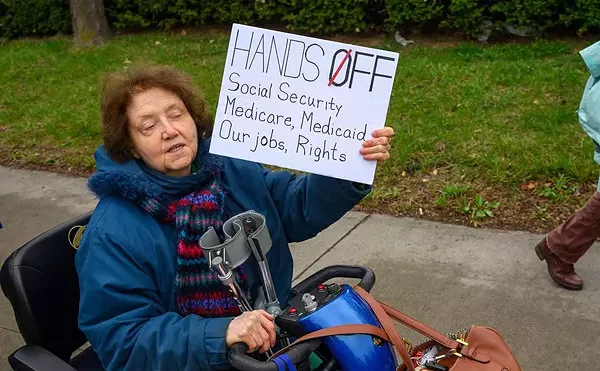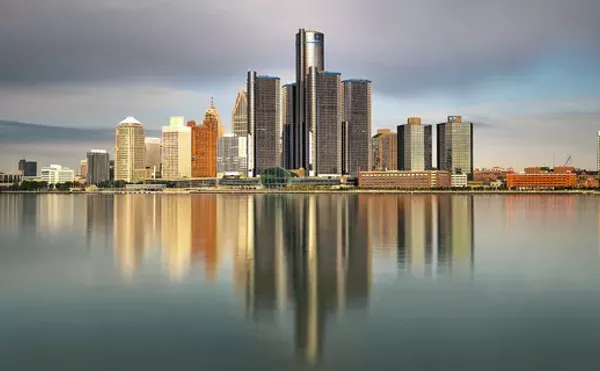
Audio By Carbonatix
[
{
"name": "GPT - Leaderboard - Inline - Content",
"component": "35519556",
"insertPoint": "5th",
"startingPoint": "3",
"requiredCountToDisplay": "3",
"maxInsertions": 100,
"adList": [
{
"adPreset": "LeaderboardInline"
}
]
}
]
Population is the code word that Lansing uses to pass legislation for Detroit. Once upon a time, a population of 1 million or more worked. Later laws used 900,000, or 800,000 or 750,000 as the magic number. But earlier this year, when the U.S. Census count showed the city tally had tumbled to 714,000, more than 70 laws — covering issues from racetracks to operating a health department — were thrown into limbo.
"Some of them have relevance to folks statewide, some of them have fiscal impacts and some of them don't," says Dan Lijana, spokesman for Mayor Dave Bing. "The legislative strategy will be determined by all of that."
Some of the laws deal with the city's ability to collect taxes and issue bonds, levy special assessments for snow removal and enjoy special provisions that allow for higher license fees and the number of racetrack licenses that may be issued for Detroit and its surrounding counties.
Some of the laws are outdated, including those allowing empowerment zone designations that were used in a federal government program that no longer exists. Statutes like that are unlikely to be addressed.
But lawmakers in Lansing have started addressing some of the more relevant provisions. The Detroit caucus is working with Mayor Dave Bing's staff to identify priorities and draft bills for fall introduction, officials say.
Because losing the income and utility tax revenue would have been so costly for the city, legislators dealt with those first. The Detroit income tax of 2.5 percent for residents and 1.25 percent for nonresidents working in the city raised nearly $217 million in 2010 while the utility tax brought in about $44 million, according to the House Fiscal Agency.
In May, several Detroit representatives co-sponsored bills to allow Detroit — coded as any Michigan city with a population greater than 600,000 — to continue charging a higher income tax than is normally permitted in Michigan and to continue levying a utility tax.
Both chambers passed the bills in June, and Gov. Rick Snyder signed them into law.
"It was of utmost important to do those," says Ericka Savage, chief of staff for Rep. David Nathan, (D-Detroit), co-chair of the Detroit caucus. "Other bills will be introduced this session."
Several have been drafted. "There are some that deal with home rule, representation on the port authority and a lot of different areas that we have to hopefully get addressed later this year," Savage says.
Currently, mayors of 750,000-resident cities can appoint two members to the five-member Port Authority, to cite another problem. For Detroit to keep its two members, the law would have to be changed.
Tracking transit
The population drop has also raised questions about the way millions of federal transit dollars flow not just to Detroit to but to southeastern Michigan. Is the law establishing the Regional Transit Coordinating Council invalidated by the population drop? Or can lawmakers use a challenge to the RTCC to create a new and more relevant regional authority?
The RTCC is the pass-through agency required by federal law for federal transportation funds to reach the Detroit Department of Transportation and the regional bus service, SMART. The RTCC also funnels state monies — about $82 million this fiscal year — from the Michigan Department of Transportation to the two local transit services.
DDOT received about $49.3 million and SMART about $27.8 million in 2010, says Sharon Edgar, administrator of the office of passenger transportation at the Michigan Department of Transportation.
Current law allows cities of more than 750,000 to form an RTCC whose members are the Detroit mayor and the executives from Wayne, Oakland and Macomb counties.
"There are a lot of questions right now about whether the RTCC can exist, should exist and does exist right now," says Adam Hollier, chief of staff for Sen. Bert Johnson (D-Detroit).
The state has not taken an official position about the RTCC's legal status, nor has anyone pushed for a legal opinion about it, Edgar says.
"What the discussion has been at the state level is that the RTCC was already incorporated, they are incorporated and they continue to exist as an incorporated entity," she says. Edgar says the discussions at the state level have leaned to the position that falling below the threshold to establish an RTCC does not invalidate an existing one.
But these RTCC discussions have considered the need for a more comprehensive regional transit authority that could better administer funds including those for planned light rail projects beyond the city, Hollier says.
As part of that, Johnson introduced legislation this summer for such an authority that could have a part in a metropolitan light rail system if it is ever planned, funded and constructed.
"We think this is an important opportunity to create a regional transit authority that works, something that will be beneficial for the region," Hollier says.
In the mayor's office, Lijana acknowledged that "we're having those conversations."
Money matters
Last year Detroit used $250 million in fiscal stabilization bonds to relieve short-term debt. But the state law allowing the issuance of the bonds requires 750,000 residents, meaning the city couldn't issue bonds now.
Lijana says amending that to a lower population threshold is a high priority for the mayor's office.
And it's one of about 10 bills the mayor's staff is working with legislators to draft.
As with anything perceived as giving Detroit "special treatment," Rep. Fred Durhal, (D-Detroit) says the Detroit caucus expects continued "pushback" from other legislators. With the next biggest city, Grand Rapids, at about 188,000, it's really only Detroit that such legislation affects.
"There have been some people who just don't like it because they're provisions for Detroit," Durhal says. "It's been referred to colloquially as 'the black hole' where everything goes in and nothing good comes out. ... I think the city still offers a lot to the state and I think the value of it is growing and getting better."
But whatever reluctance there might be in the Legislature isn't visibly shared by the governor's office, says Bill Ballenger, editor of Inside Michigan Politics. "It's a very positive atmosphere, I think, coming from the administration in Lansing toward Detroit," he says. "I think the Snyder administration has demonstrated a real interest and commitment in trying to resuscitate Detroit and is reaching out to Detroit."
Bing and Snyder share as good a relationship as Ballenger has seen between a Detroit mayor and a governor since Coleman Young and Bill Milliken. "In the '70s, they were the odd couple: the Republican governor from Traverse City and Coleman Young — and yet they got along," Ballenger says. "But what you've seen from Bing and Snyder is kind of extraordinary too."
Still, the relationships between Detroit and legislators who don't directly represent the city are more challenging. Detroit's representatives and senators are Democrats but the Republicans hold a majority in both chambers. And most of the legislators are from outstate Michigan and not metro Detroit, making communication and understanding a challenge, Ballenger says.
"They struggle to really relate to Detroit," Ballenger says. "But the fact that Snyder has been so positive and the Legislature and Snyder are getting along so well together, that mitigates the pain that Detroit may experience."





